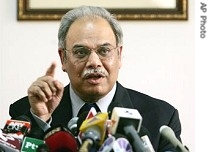2006年VOA标准英语-India, Pakistan Agree to Form Joint Anti-Terror(在线收听)
By Anjana Pasricha
New Delhi
15 November 2006
India and Pakistan, during two days of peace talks in the Indian capital, have agreed on measures to combat terrorism and reduce the risk of nuclear accidents. The talks have revived a peace process that stalled four months ago after deadly train bombings in India's financial hub, Mumbai.
-----
At the end of two days of talks between the top diplomats of India and Pakistan, the two countries on Wednesday announced the establishment of a three-member panel to share information and combat terrorism.
The decision to set up such a mechanism was made by the heads of the two countries after India accused Pakistan's spy agency of aiding deadly bombings on commuter trains in Mumbai in July. New Delhi says it will provide evidence of this to Islamabad after completing legal processes at home.
However, Indian officials say they have handed over what they call "proof" to their counterparts that Pakistan-backed Islamic extremists carried out bombings in New Delhi in October of last year, and in Varanasi in March.
Indian Foreign Secretary Shiv Shankar Menon said he hopes Islamabad will take action against these groups based on New Delhi's evidence.
"It is the cross-border links that we raise with Pakistan, and that the anti-terrorism mechanism gives us a way of dealing with," said Menon. "Now that we have given some information, this mechanism, we hope, will meet soon and we hope that it will take some action."
 Riaz Mohammed Khan talks to reporters in New Delhi, Wednesday Nov. 15, 2006 |
||
The nuclear-armed neighbors also finalized a pact on reducing the risk from atomic accidents, and said it would be signed soon.
However, little progress was reported on the main dispute that has troubled India-Pakistan relations for decades - the Himalayan region of Kashmir, which is divided between the two but claimed in its entirety by both. India has ruled out troop reductions in the part of Kashmir it controls, saying militant attacks continue to rock the region.
Pakistan's Khan called for a speedier resolution of the dispute.
"An opportunity exists by virtue of the improved relations between the two countries and by virtue of the conducive international environment to address the issue and resolve it," he said.
Khan also urged India to reduce troops on the Siachen glacier, 5,500 meter-high, icy battlefield in Kashmir where Indian and Pakistani troops have faced off since 1984.
But India said there is a "gap between the position of the two countries" on that question, suggesting that there will no change for the moment.
Despite their differences, both sides reiterated their commitment to resolving their disputes and normalizing relations through negotiations.